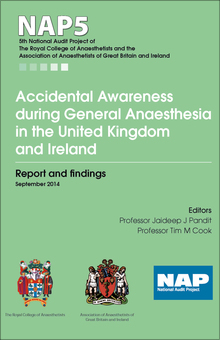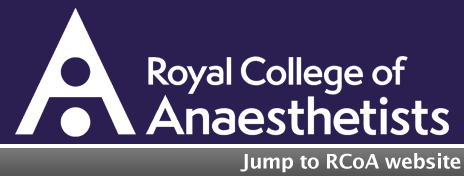NAP5 Statement February 2013
Study covering whole of UK and Ireland will identify cases of and risk factors for accidental awareness during general anaesthesia
A project that studies accidental awareness during general anaesthesia is underway in the UK and Ireland. The Fifth National Audit Project (NAP5) of the Royal College of Anaesthetists (RCoA) and the Association of Anaesthetists of Great Britain and Ireland (AAGBI) will reveal how many patients experience this rare but potentially distressing complication.
Accidental awareness during general anaesthesia (AAGA) happens when too little anaesthetic is given to a patient to keep them fully unconscious, during surgery or other medical procedures. Patients who experience AAGA can remember events that take place just before or during their surgery. Sometimes all the patient can remember is noise or the sound of people talking, but some describe a feeling of suffocation or even feeling the pain of surgery without being able to move or make a noise.
"Accidental awareness is a common cause of concern for many patients, but we are still not sure how often it happens and what factors make it more likely to happen", said NAP5 Clinical Lead Professor Jaideep Pandit, a Consultant Anaesthetist in Oxford.
"More than three million general anaesthetics are given every year in this country and only a small number of patients experience awareness. However, the distress that it can cause means that it is important to study the problem in detail."
"Some studies suggest that accidental awareness may occur in as many as one in 600 general anaesthetics", said RCoA National Audit Project advisor Professor Tim Cook, Consultant in Anaesthesia and Intensive Care Medicine in Bath, "but not all anaesthetists accept this number as reflecting modern practices. Our ultimate goal is to develop national guidance that will decrease the chances of patients being aware during their operations. The study will also help explore whether it is worth investing in technology that can measure the depth of anaesthesia."
NAP5 is probably the largest study of anaesthetic awareness ever performed. The project began on 1st June 2012, and will collect data for one year. It has received the endorsement of all four Chief Medical Officers in the United Kingdom and is also being supported by the College of Anaesthetists of Ireland. As with previous National Audit Projects, NAP5 has the support and involvement of every NHS hospital in the UK as well as all hospitals in the Republic of Ireland.
As well as recording the number of cases of AAGA, the study will seek to determine the risk factors for this problem. Local NAP5 Coordinators are actively seeking to identify all cases reported within this one year. Each case will be analysed in detail by an expert panel so that as much can be learned about the occurrence as possible. Once the study is complete, all the results of NAP5 will be made freely available to clinicians, the public and media without restriction, as for previous NAP initiatives.
"This shows that the profession continues to take the concerns of the public seriously", said Professor Jaideep Pandit, "the results of this study will allow us to improve patient care by understanding what factors are associated with awareness and what we can do to prevent it."
Other NAP Projects
The National Audit Projects of the Royal College of Anaesthetists and its partners (NAPs) have each examined the incidence and factors associated with specific uncommon complications of anaesthetic practice. NAP3 examined the major complications of spinal and epidural injections, and studied the complications of more than 700,000 procedures. NAP4 addressed major breathing complications, and studied the complications of approximately 3,000,000 general anaesthetics for surgery, 60,000 patient stays on intensive care units and 20,000 anaesthetics given in emergency departments. Perhaps uniquely, both these projects have involved every NHS hospital in the four nations of the UK. The full results of NAP3 and NAP4 are freely available to the profession and public, and numerous resources can be downloaded at http://www.rcoa.ac.uk/nap3 and http://www.rcoa.ac.uk/nap4. The results of NAP3 and NAP4 have been judged to have international importance and both have led to changes in clinical practice, improving the communication of risks to patients and increasing safe practice throughout the UK.
About the RCOA
The Royal College of Anaesthetists is the professional body responsible for the specialty throughout the UK, and it ensures the quality of patient care through the maintenance of standards in anaesthesia, critical care and pain medicine. To find out more about the RCoA, please visit http://www.rcoa.ac.uk.
About the AAGBI
The Association of Anaesthetists of Great Britain and Ireland (AAGBI) is the professional representative membership body for over 10,500 anaesthetists in the UK and Ireland. The AAGBI promotes patient care and safety, and advances anaesthesia through education, publications, research and international work. To find out more about the work of the AAGBI, visit www.aagbi.org.








